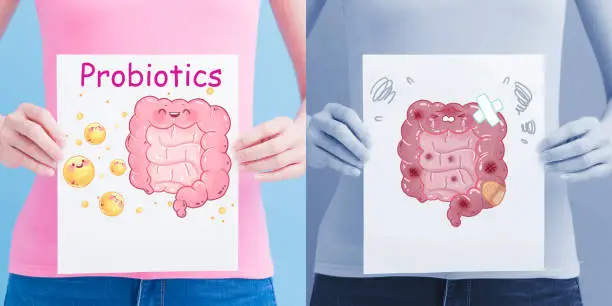In today’s health-conscious world, probiotics have become more than just a buzzword —they’re a part of everyday wellness. From yogurt packaging to supplement shelves, they’re everywhere. But have you ever paused to ask, what are probiotics really, and why are they so important for our health?
Let’s break it down in this easy-to-understand, informative guide to gut health.
What Are Probiotics?
When taken in the proper amounts, probiotics—live microorganisms, mostly beneficial bacteria and yeasts—offer a host of health advantages, particularly for your digestive system.
Imagine them as the protective force inside your gut, working tirelessly to fight off harmful invaders and maintain balance. Although your body naturally hosts these friendly microbes, you can also boost their numbers through food and supplements.
Why Probiotics Matter
A diverse community of microorganisms known as the gut microbiome lives in your gut. When this ecosystem is in balance, your body performs better, from digestion to immunity. But daily stressors, processed foods, antibiotics, and irregular sleep can disrupt this harmony.
That’s where probiotics come in:
✅ They help rebalance gut flora
✅ They support smoother digestion
✅ They reinforce immunity
✅ They can even positively influence your mood
The Surprising Benefits of Probiotics
1. Improved Digestive Health
Probiotics are best known for easing digestive issues like bloating, constipation, and IBS. They aid in breaking down food and keeping your gut running smoothly.
2. Stronger Immune Defenses
A healthy gut fuels a strong immune response. Probiotics can help your body ward off infections more efficiently.
3. Mental Wellness Boost
Did you know there is a connection between your brain and gut? This “gut-brain axis” means a healthy gut may ease symptoms of anxiety, stress, and even depression.
4. Weight Regulation
Certain strains of probiotics may help regulate metabolism, balance insulin levels, and prevent unhealthy fat storage, supporting weight management goals.
5. Reduced Antibiotic Side Effects
Probiotics protect your gut during antibiotic use by replenishing good bacteria and reducing issues like diarrhea.
Where to Find Probiotics Naturally
You don’t always need a pill to get probiotics — many foods naturally contain them. Try adding these to your diet:
- 🥛 Yogurt (check for “live cultures”)
- 🍶 Kefir
- 🌶 Kimchi
- 🥬 Sauerkraut
- 🍱 Tempeh
- 🍜 Miso
- 🧈 Traditional buttermilk
- 🧋 Kombucha
- 🥒 Naturally fermented pickles
✅ Pro Tip: Look for products labeled “contains live and active cultures” for the best results.
Probiotics vs Prebiotics: Know the Difference
Many people confuse probiotics with prebiotics, and while they’re closely related, they serve different roles:
- Probiotics = The good bacteria in your stomach.
- Prebiotics = The fiber-rich food that feeds those good bacteria
Bananas, leeks, onions, garlic, and oats are among the foods that contain prebiotics. Together, they help your gut ecosystem flourish.
Should You Take Probiotic Supplements?

Supplements can be a great option if your diet lacks fermented foods. But not every supplement is effective. Here’s what to consider:
✔️ A CFU count of 10 billion or more
✔️ Multiple strains for broader benefits
✔️ Delayed-release capsules that survive stomach acid
✔️ Cold storage if required (always check the label)
🔍 Reminder: Consult a healthcare provider before adding any supplement, especially if you have medical conditions or are on medications.
Busting Myths About Probiotics
1: All bacteria are harmful.
Your body relies on beneficial bacteria for essential functions.
2: Probiotics give immediate results.
They require consistent intake to make a lasting impact.
3: You only need them when you’re sick.
Daily probiotic intake can support overall wellness and act as a prevention.
Final Thoughts: A Small Step to Big Health
Probiotics aren’t just another fad —they’re powerful allies in your journey toward better health. From improving digestion to strengthening immunity and even uplifting your mood, they offer benefits that go far beyond your gut.
You don’t need to overhaul your lifestyle overnight. Just start small — maybe with a cup of kefir or a spoonful of probiotic-rich yogurt at breakfast.
FAQs:
1. What are probiotics, and how do they benefit gut health in 2025?
Probiotics are live microorganisms that support the balance of good bacteria in your gut. In 2025, they’re recognized for improving digestion, reducing bloating, and enhancing nutrient absorption. New research also links probiotics to improved brain-gut connection and mood regulation.
2. Which probiotic strains are considered the most effective in 2025?
Top-performing strains in 2025 include Lactobacillus rhamnosus GG, Bifidobacterium lactis, and Saccharomyces boulardii. These strains support immune health, relieve IBS symptoms, and help restore gut flora after antibiotics.
3. Can probiotics help with immunity and overall wellness in 2025?
Yes, probiotics are known to strengthen the immune system by enhancing the gut barrier and regulating inflammatory responses. In 2025, they’re widely used to reduce the frequency of colds, allergies, and digestive infections.
4. Are there any side effects of taking probiotics daily?
Most people tolerate probiotics well. However, some may experience mild bloating or gas initially. These symptoms usually subside within a few days as the gut adjusts. Always choose a reputable brand and consult a healthcare provider if you have underlying health conditions.
5. What’s the best way to choose a high-quality probiotic supplement in 2025?
Look for supplements that list specific strains, have at least 10 billion CFUs (colony-forming units), and offer delayed-release capsules to ensure bacteria survive stomach acid. Third-party testing and transparent labeling are also essential for quality assurance in 2025.

